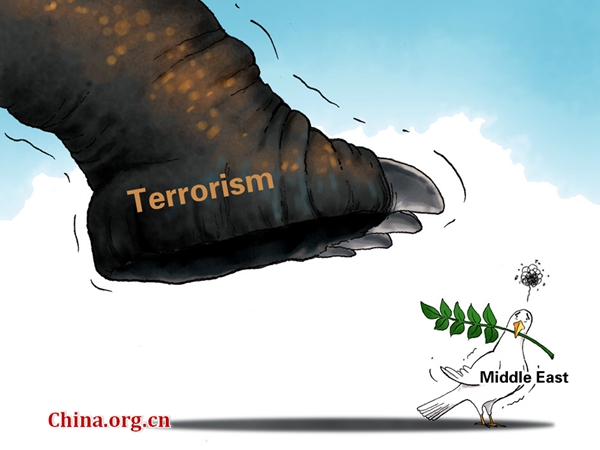Is military intervention by external powers a cure?
- By Jin Liangxiang
 0 Comment(s)
0 Comment(s) Print
Print E-mail China.org.cn, January 4, 2016
E-mail China.org.cn, January 4, 2016
|
|
|
Dove Little [By Zhai Haijun/China.org.cn] |
Military intervention by external powers has been enshrined as a major means of tackling the ISIS threat in the Middle East region as the U.S., France, Britain, Germany and Russia have been involved militarily in the fight against ISIS. However, military intervention by external powers is far from a cure of the ISIS disease, despite its previous success in addressing conventional security threats and its initial effectiveness along some fronts.
External military intervention truly has served to maintain regional order in the 1990s and to prevent serious humanitarian problems from taking place. In 1991, the multi-national forces led by the U.S. and authorized by the UN Security Council launched a military campaign, which drove Saddam Hussein's forces back to Iraq. That operation not only restored Kuwait's sovereignty but also protected the UN principle of no change of borders by military means.
On April 5, 1991, U.S., Britain and France established a security zone in Iraq's Kurdish region to protect Kurds from being oppressed. In August 1992, the U.S. also established a no-fly zone in southern Iraq in order to protect Shiite muslins from persecution of Saddam's regime. Despite some questions about the legality and legitimacy, the two security measures might have served to prevent more serious humanitarian crises from happening.
It might be because of the success of the above-mentioned experiences that external military intervention has been worshiped as a therapy for Middle Eastern security problems. Thereafter, external powers, particularly the U.S., were often requested to send troops to deal with regional issues. The U.S. was requested to bomb in order to solve the Iran nuclear issue, to bomb in order to overthrow Muammar Qaddafi's regime and to bomb as a means of solving the Syrian crisis. These requests actually serve the taste of the U.S. as a dominant power in the region despite its recent prudence.
Under this logic, it's easy to understand why external military intervention has been expected to defeat ISIS. It is true that military actions taken by external powers might be effective in destroying the forces and facilities and infrastructures of terrorist forces. The air strikes by external powers combined with the offenses on the land by local troops in particular have proved to be effective in regaining the territories controlled by ISIS. The recent retreat of ISIS in Syria and Ramadi in Iraq are both examples.







Go to Forum >>0 Comment(s)